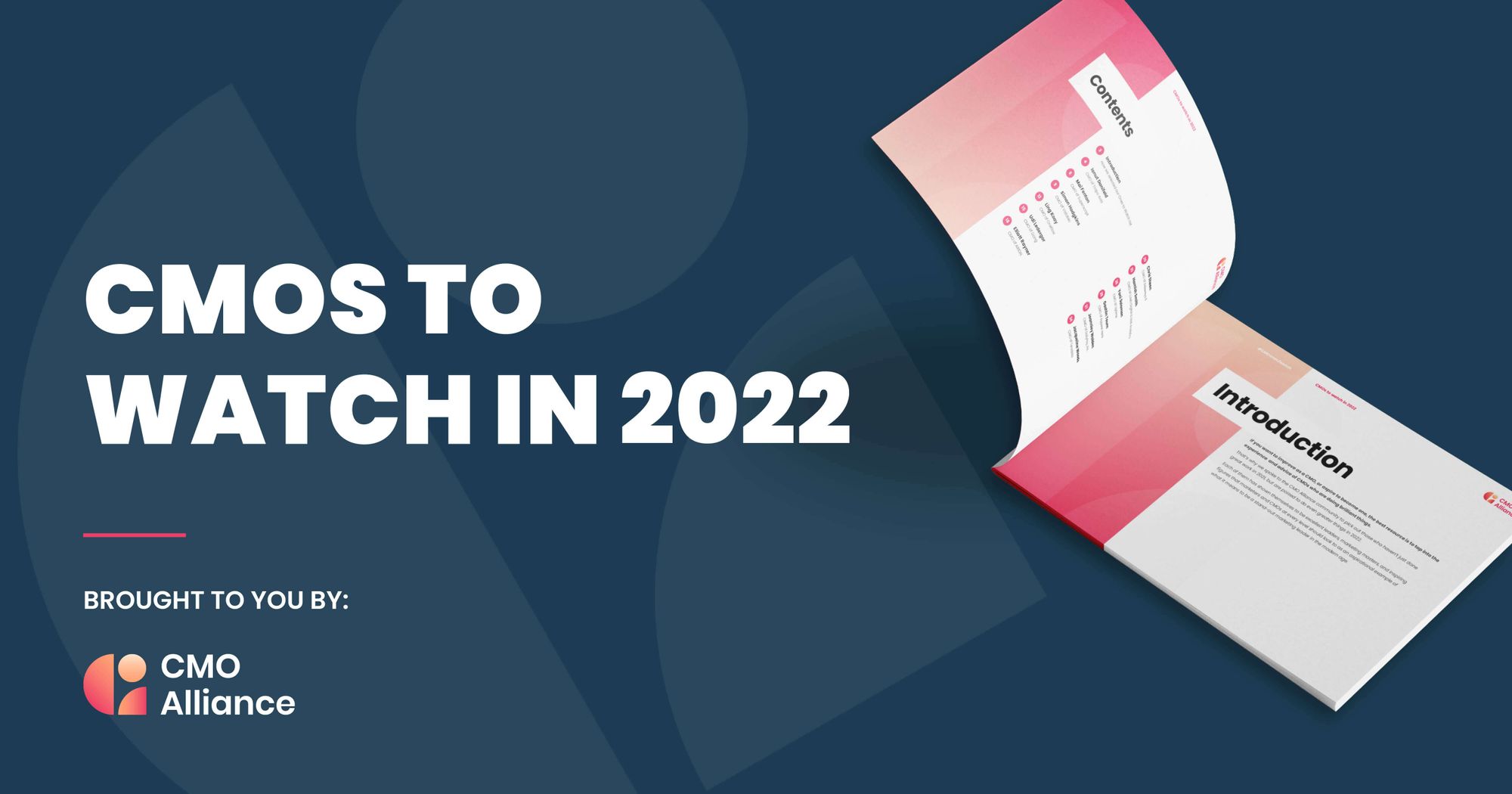Are CMOs facing impossibly high demands? Maybe.
CMOs in many organizations often find themselves having to cover an extremely broad range of duties, many of which might be far from the specialties and strengths you've developed over your career.
This can be a major problem, both for the organizations, and a marketer's own career development. That's why we spoke to Ling Koay of Oneflow, on why she pushed for her new role as Chief Brand Officer and stepped away from the CMO position. Dividing responsibilities, so she can focus on her specialty.
Ling examines the difficulties many CMOs face from being pulled in too many directions, and why it's crucial for marketers to own their superpowers when it comes to their career development.
Originally an episode of CMO Convo, but read on for a full write-up of what we discussed.
We cover:
- Ling's background
- Do CMOs have too many duties?
- The importance of passion in marketing
- The value of brand in startups
- Ling's ultimate career advice
Prefer to listen? Check out Ling's appearance on the CMO Convo podcast 👇
Ling's background
Hi, Ling, we're looking forward to diving into this, as it's all about something you shared as part of your "CMOs to watch in 2022" profile, about breaking up the CMO position, dividing the responsibilities. Because it seems that the higher you get as a marketer, the further away you move from the marketing functions that attracted you to the role to begin with.
But before we get into that, maybe you want to tell us a bit about your background and your role at Oneflow?
Absolutely. I've been working in marketing for many years, and it has been my passion. I started off with my own agency, and we sold ideas to companies. I've worked my way up from being a marketing assistant to being the Vice President of brand at Oneflow. I've always worked with B2B Marketing and realize that marketing is hard.

Do CMOs have too many duties?
It's really hard, especially with the amount of responsibilities CMOs face in B2B startups. There seems to be a lot of demands on their responsibilities that they might not be familiar with before.
A lot of CMOs might have come up through content routes, or they might have come up through product marketing routes, and suddenly they're in demand/lead gen, dealing with finances, and they might not have been trained to do that.
It's a problem that you highlighted in your ‘CMOs to watch’ profile. Do you want to explain a bit about why you saw that as an issue and something that needs to be highlighted?
I realized that the CMO tenure is three years on average. I realized that it’s maybe related to how the profession itself is perceived by our peers. Is it marketing in terms of demand generation? Or is it marketing in terms of brand and storytelling? And these two roles conflict with each other. What we're telling our CMOs to do is potentially setting them up for failure.
I spent so many hours, days, and months thinking about how and why this role is so conflicted. Really, what we're trying to do here is to get our marketers to both run a marathon and sprint at the same time.
Sure, that works for some companies. And if you don't care about your marketer being really good at what they do, that works. A marketer can be a generalist and be really good at both a sprint and marathon, but they will never win the award.
They will never be number one. You cannot be good at everything. I think the CMO profession itself needs to change. And I see the future of B2B marketing especially as having both the chief brand officer as well as this chief marketing officer working alongside each other on the same executive table.
Definitely, it makes sense! Especially in the B2B space where brand is becoming more and more important. For a long time, a lot of B2B companies kind of neglected brand.
But in a world of very targeted ads and very easily accessible data, we're able to just focus purely on demand gen. But that's changing with the death of cookies and the rise of GDPR and more regulation around data control.
We're not gonna be able to do that kind of targeting. That's gonna mean that the brand is even more important. It’s absolutely essential to stand out in a very crowded marketplace. Was that the kind of perspective that you were coming from? Or was it related to internal organizational stuff?
Absolutely. Google kills marketing, in general. I mean, sorry to say, but if you look into the ads that have been working for the past 40-50 years, it's those Coke brands. They’re still working today. That’s because the brand has gone through the test of time.
Demand gen is an important field as well. I feel that our marketing in the CMO role has switched into demand gen now, and the brand has to take a backseat. Obviously, business-wise, revenue is important. But I also think it is super important for businesses to retain talents that are good at what they do, not just to satisfy the need to have a CMO on our executive table.
Obviously, they will be forced to prove their worth. When you try to focus too much on sprints– which is the equivalent of running campaigns each and every month— we will review our KPI and see how much money has been invested in this and how much money we're getting back.
We tend to forget that brand takes a longer time, and in that time lag, are you seeing a return on the investment? On the executive seat, we need to make sure that brand doesn't take the backseat.
If you have a marketing team of 12 people, maybe half of them would want to be on the executive table. But really, there is no career path that they can follow to make their dreams come true. You're either forced to learn budgeting forecasting so that you can become the CMO the world wants you to become. Or, I mean, if we are able to change the way we look into the marketing profession today on the C-level, you need to be really good at what you do.
Create the message and ensure that the story is being told again and again. How do you fit into the position in the market? How do you create a category? How do you build a community surrounding your brand? How do you ensure employer branding is being taken seriously at a company level?
With marketing, you create the message, create the strategy, but then there's another set of marketing that is about distributing the message, and making sure it gets to the right target audience at the right time in the right channel.
Maybe it’s about splitting the CMO role into the tactic side in the short term, and the strategy side in the long term?
I wouldn't call it the "short term" versus the "long term". I would say it's more about being super good at what you do. And that's where the superpower comes in. If you think about it, your brain has to focus on both running sprints, and marathons at the same time. One of them will have to take the backseat.
I mean, we're not good at thinking about two things at one time either. You can say whatever we want about women being multitaskers, but each of the tasks maybe is not done as perfectly as they would have been if it wasn't a multitask.
I don't believe in simply accomplishing a task without doing the deep work involved. I truly believe that if you have the opportunity to focus on your superpower, you can achieve mastery that no one else can take from you.
That goes back to the fact that, if you’re new to marketing today and you want to understand how to get to the C level, the first thing that people have to do is to test everything and see what you actually feel passionate about.

The importance of passion in marketing
What you're saying about being passionate about your work, that's incredibly important in marketing. To be creative about it, you have to be passionate about it. Obviously, sometimes you have to engage with things you don't like in your career.
But if it's shaping into a career that you're not happy about, you're not going to want to take that career path, which means we're missing out on some very valuable creative voices in the C suite.
They could be the proponents for this brand strategy for not just brand strategies, but any type of marketing that’s maybe not getting its fair share in the C suite? Is that what it's gonna be about, granting a better route for people to get to the top? Does it start from the bottom? Or is there a top-down approach we can take?
I definitely think it should be a top-down approach. If you look at the B2C industry, having a brand at the top C-level is very very uncommon in the B2B world. If you're in the B2B world, maybe a startup founder would want to put focus on two roles, rather than just one CMO setting up operations and setting up campaigns, and rebranding at the same time.
I think this is where the conflict comes in, when the brand takes the backseat. There's always a reverse engineer of the brand. The other part is, of course, I know a lot of people that have been CMO and have been frustrated with the fact that we’re not doing things that we really feel passionate about.
Instead, you’re being pulled into different meetings to prove KPI and most of your weeks and months are spent on making sure we can track the channel attribution model, etc. Maybe that's something that’s very interesting too, but maybe that's not something you are passionate about, especially if you’re coming from traditional marketing. Then they will maybe move to another company, and the cycle repeats itself.
Then they quit again, and then maybe they will start their own agency as brand consultants. That explains why the average turnover for a CMO is just three years. I’m not discounting the value of having a number-oriented CMO. It’s super important, but as our technology evolves, there is the need to have both this revenue-focused marketer as well as this brand, content, product marketing approach.
It’s important to have these different types of marketer communities working alongside each other. I'm not suggesting that they should be separate departments. I'm just suggesting that both team leads should have a voice on the management level, on the leadership level. Neither of them needs to take a backseat.

The value of brand in startups
Isn't it tricky with startups, they just don't have the resources to have these multiple marketing leaders? Is it possible to have both in a resource-poor environment? How can you satisfy both needs?
One of the reasons that they want a lone CMO to come in and do everything is because that's all they can afford. At the end of the day, is it really practical to take this approach in an early-stage company?
Well, again, I'm not suggesting that you would hire two people at the same time. I think it's a good idea to look into what your CMO is good at, and what the biggest skills gaps are. But you have to bear in mind that at some point, while you scale the company, you're going to need to have two marketers with two different focuses.
So, as the founder, if the company is really good with data operations, well, then hire a CMO who's really good with brand, storytelling, positioning, and messaging. Then, at some point, you could maybe hire a demand gen person.
But, if it's vice versa, if the stories are there, and the founders are really good with variety, copy, messaging and positioning, then a focused demand gen marketer would be more important as the CMO from the beginning.
I would say that it’s important to bear in mind that the future of marketing really needs to be split into both a marathon and a sprint, between campaigns and doing the longer-term strategy formulation. Start with the one you have the biggest need for in your company.
Definitely. If someone's in the CMO role right now and they’re thinking of maybe switching over to a Chief Brand Officer role, they're gonna need to communicate the value of that position.
You're basically creating a new position where the company might have to hire a new person to step into demand gen. What is the value of stepping up and having the voice we've talked about? What is the value of building such an emphasis on brands for organizations?
I truly believe that love is the ultimate growth strategy for companies. That has to do a lot with brand, right? Brand is the only asset that you have control of. Companies don't have control of their effect, speed, quality, or price. Any competitor can duplicate, or be better at those fights. But the brand is something that is company-owned.
It's the only thing that you have control over. In order to create a brand that drives demand, companies need to look into creating a brand that people will love. What happens when you fall in love with a brand? There's research that shows that with love comes referral.
A McKinsey study found that 64% of people would recommend a brand that they love to their friends and family. A third of our buying journey consists of brand-related activities. People asking for recommendations is not something that’s probably shown in an attribution model.
But people are going to their friends and peers to ask for recommendations for tech stack, for instance. If you're selling to sales and marketing, you want to make sure that they love your brand.
If we want to take it to a more human level, we want to buy things that are brands we would choose ourselves and they don’t have to be sold to us. When we love something, there are three different kinds of chemicals that happen in our brains.
The first is adrenaline. When you fall in love, you get adrenaline. And what does that mean? It’s a kick, and you want more of that kick. There’s also Oxytocin. Oxytocin is a hormone that is produced by mothers who are breastfeeding their babies. That's when you kind of feel safe. You feel like you can trust.
The third one would be dopamine. Dopamine is a hormone that allows you to store memory long-term, so you remember that positive feeling. So, to summarize, if you feel that with a brand you would want more of it, you feel safe with it and you can trust it, that’s a positive sign.
Also, people can remember it. Even if your brand doesn't hit the first time, maybe on the eighth time people will be ready to buy. Then your job as a brand marketer is to make sure that people remember you. That's why I truly believe that creating a brand that actually drives demand and growth for the company equals creating a brand that people love.
It's a really beautiful answer. That was absolutely lovely. You hit the nail on the head. There's so much evidence out there to show that B2B startups that are taking this brand-first approach, it's really paying off for them. Gong is a great example as a brand. It's absolutely incredible the way they're building the brand.
They had their first Superbowl ad this year. People love that brand. They've grown so much, and they’ve built this awesome brand, and this awesome community around it.
Maybe that's what we need, more B2B companies to split up the CMO role by giving someone the power to actually take a brand and really build it from the early stages as well. It gives people a chance to fall in love early on.
It's a great example. I mean, they're not just creating a brand that people love, but they’re also teaching us something. It's not just this fluffy thing, it’s about educating, giving insights, and giving value. If you look into their content, it's always data-backed. There is data from the research lab, and all the content.
So, let’s imagine the CMO of Gong’s career path, for example, maybe he would probably change jobs at some point in time, because maybe he will be aiming to become the CEO one day and he wants to have more influence in the company he's a part of. Or maybe he’s this unicorn that loves doing what he does.
The thing is, human beings need to be recognized, they need to have a bigger influence and leave a legacy. One way to do this is to climb the clip career ladder. And that's where I think the CMO role can really encourage young marketers, especially those that are really good at content, brand, and product marketing.
That's where you can really grow. That should be your Northstar. If you were to move to CMO, these are the things you need to fulfill before you can actually become a true rockstar CMO. I feel the importance of having this opportunity is not only to retain your best marketeers, but also to normalize the fact that marketing is not just about attribution.
You could see it developing more as companies mature. Maybe the C-suite gets more developed in an organization, you could have it evolve into different forms. Particularly in B2C, you have things like Chief Storytelling Officers and stuff like that.
That could be a route for the Head of Content to go. But maybe the focus for now should be getting the CMO and the CBO roles up and running. It sounds like a really good approach.

Ling's ultimate career advice
Just to sum everything up, what would you say to somebody who is looking to climb the career ladder, but isn't sure about taking the CMO route? Or maybe someone who's in the CMO role and thinking "maybe I want to shift to a different track"? What would your main piece of advice be?
As a young marketer, I would advise you to test everything. But when you test everything, make sure it's a ‘phase one to three’ approach. Make sure when you try out something new you go deep. Then move on to the next topic. At some point, you will reach a point where you feel like you keep thinking about this all the time, even when you’re sleeping.
That's how you find your superpower. And from there, you will know where you want to go. For existing CMO roles, if you feel like you don’t know what you’re doing but you love your company, you need to ask for change. f they don’t give it to you, change job
That's one of the best pieces of advice. If you're not happy with your role, there are other roles out there. The great resignation is not just about people at junior level jobs, it applies all the way up to the C suite.
Find your passion. And if you need to go elsewhere to find your passion, it’s out there.
Thanks, Ling!
If you've enjoyed Ling's insights, don't miss her talk at the CMO Summit on November 10th on The Ultimate Case for Brand. Get your ticket now, for this and much more on the role of CMOs and marketing leaders.





